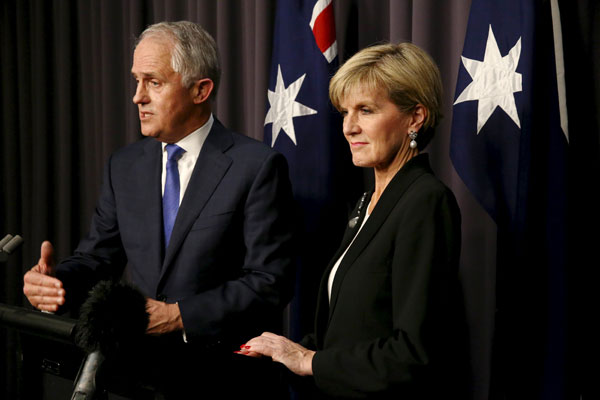Australia gets new PM as Abbott loses out to rival Turnbull
(Agencies) Updated: 2015-09-14 20:15|
 |
|
Malcolm Turnbull (L) speaks to the media alongside Australian Foreign Minister Julie Bishop following a a secret party vote which ousted Australian Prime Minister Tony Abbott at Parliament House in Canberra, September 14, 2015.[Photo/Agencies] |
"GOSSIP, GAMES"
Abbott earlier dismissed reports about a challenge as "gossip", saying he refused to play "Canberra games".
Abbott has continued to defy popular opinion inside and outside his party, despite pledging to be more consultative, blocking his MPs from supporting same-sex marriage and announcing an emissions reduction target criticised as inadequate by environmental groups.
Turnbull declined to say whether he would honour Abbott's pledge to hold a public referendum on gay marriage. On climate change, a prickly issue within the Liberal Party, he told reporters he supported the emissions target set by Abbott.
Abbott agreed last week to take in 12,000 Syrian refugees, but that news was overshadowed by rumours of a cabinet reshuffle and an insensitive gaffe about climate change, caught by a microphone at a meeting, by Immigration Minister Peter Dutton.
A Fairfax-Ipsos poll published on Monday showed that voters in the seat of Canning in Western Australia could deliver a swing of up to 10 percent against the government in Saturday's by-election.
The outcome of that vote, which had been expected to be a referendum on Abbott's leadership, will now be closely watched as a sign of Turnbull's chances of reversing the government's fortunes.
AUSTRALIA NEEDS A CHANGE OF GOVERNMENT
The change of leaders is the latest sign of political instability in Australia, which has in recent years been convulsed by backroom machinations and party coups that have shaken public and business confidence in government.
Labor's Kevin Rudd, elected with a strong mandate in 2007, was deposed by his deputy, Julia Gillard, in 2010 amid the same sort of poll numbers that Abbott is now facing. Gillard was in turn deposed by Rudd ahead of elections won by Abbott in 2013.
Abbott has now become the shortest reigning first-term prime minister to be overthrown, Rod Tiffen, an emeritus professor of political science at the University of Sydney, told Reuters.
"It's pretty amazing to think that we will have had two prime ministers overthrown in their first terms, which hasn't happened since World War Two. This shows the degree of instability within parties that we now have," he said.
Labor Party leader Bill Shorten, in a scathing press statement following Turnbull's announcement, dismissed the idea that Turnbull was capable of changing the government's trajectory.
"Australia does not need another out of touch, arrogant, Liberal leader. Australia needs a change of government," Shorten told reporters in Canberra.
- Australian minister Turnbull announces leadership challenge to PM
- Australian PM faces cabinet pressure to accept more Syrian refugees
- Australian PM urges opposition to listen to 'decent' people on China-Australia FTA
- Australia's opposition under pressure to approve China-Australia FTA
- FTA to boost Australia's Chinese wine sales






